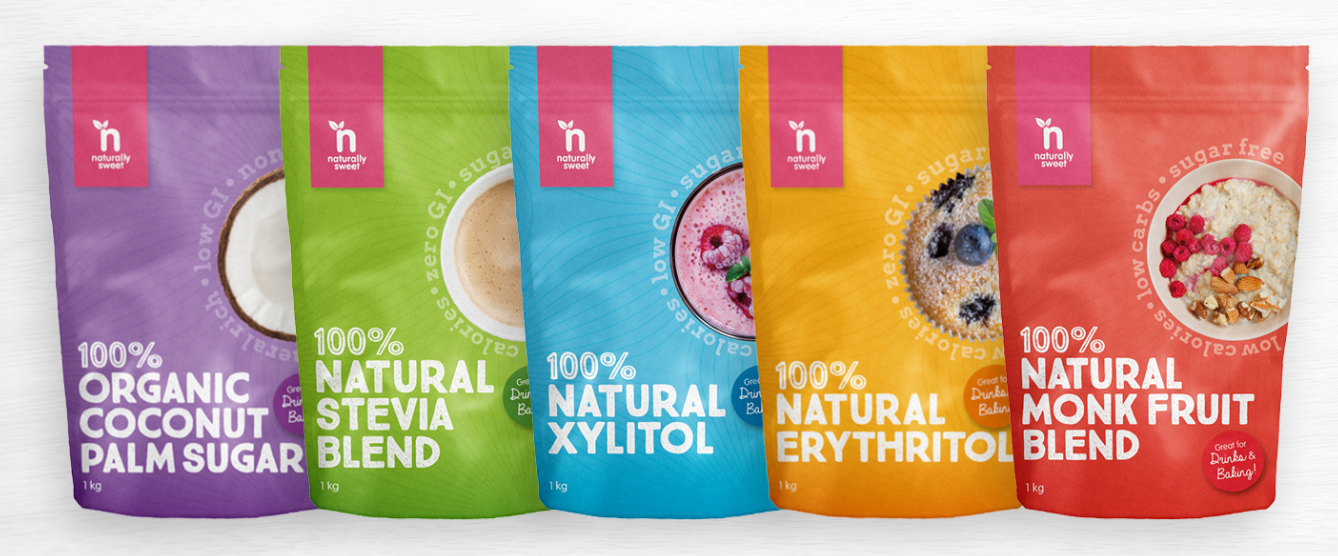What is Erythritol?
How Does it Compare with Xylitol and Other Sugar Substitutes?
When you’re looking for a sugar substitute you can easily end up lost in a jungle of strange compounds that sound so scary and artificial that you give up!
The good news is that many of these compounds are actually natural, especially if their scary name ends in “-itol”. You’ve probably already heard of xylitol, which is derived from birch wood and other vegetable matter.
Erythritol is a naturally-derived sugar substitute, produced by a fermentation process, that looks and tastes very much like sugar, yet has almost no calories. It comes in granulated and powdered forms.
Erythritol has been used in Japan since 1990 in candies, chocolate, yogurt, fillings, jellies, jams, beverages, and as a sugar substitute.
Erythritol is classified as a sugar alcohol. Sugar alcohols, also called polyols, are sugar substitutes that are either extracted from plants or manufactured from starches. One of the more common sugar alcohol sweeteners is Xylitol.
Sugar alcohols also occur naturally in plants. Erythritol is found naturally in small amounts in grapes, melons, mushrooms, and fermented foods such as wine, beer, cheese, and soy sauce.
Where does erythritol come from?
Erythritol is also derived from the natural sugars in plants – mainly corn. Once these sugars are extracted from the corn, they’re fermented to produce compounds called polyols, or sugar alcohols.
How is Erythritol Made?
Erythritol is usually made from plant sugars. The result is mixed with water and then fermented with a natural culture into erythritol. It is then filtered, allowed to crystallize, and then dried. The finished product is white granules or powder that resembles sugar.
Why Do People Use Erythritol?
- - Erythritol has a clean, sweet taste and is approximately 70% as sweet as sugar.
- - Erythritol has almost no calories. In the United States, erythritol is labeled as having 0.2 calories per gram, which is 95 percent fewer calories than sugar. In Japan, erythritol is labeled as having zero calories.
- - Erythritol has not been found to affect blood sugar or insulin levels and has a zero glycemic index.
- - Erythritol isn’t metabolized by oral bacteria, which means that it doesn’t contribute to tooth decay. Erythritol was approved for use as a sugar substitute in Japan in 1990. It was approved in Australia and New Zealand in 1999.
I’m adding alcohol to my coffee?
Don’t worry! The alcohol you’re thinking of is ethyl alcohol, or ethanol, which isn’t in your erythritol! Polyols are molecules that are part-sugar, part alcohol and it’s the sugary bits that offer the sweet taste. Fortunately, your body can’t process these molecules any further so you don’t digest or absorb any of the sugary bits and you definitely won’t be getting tipsy on the alcohol bits!
So erythritol is a sugar then…
Yes, it is; which is why it makes an ideal substitute for your regular calorie-laden sugar. Erythritol looks like sucrose and to a certain extent behaves like it as well. It’s around 60-80% as sweet as sucrose and, crucially, 0% as fattening. You can use erythritol weight-for-weight as a sucrose substitute, which makes life easier.
Is it similar to xylitol?
It’s very similar to xylitol, apart from the fact that it’s less sweet. It’s better for baking than xylitol as it doesn’t dry out your cakes and biscuits as much and it also doesn’t have the strange aftertaste that some people experience. Erythritol is heat-stable to around 160C so it’s good for baking and lots of other recipes that need sugar. You might notice, however, if you only use erythritol in the recipe, that the sweetness feels “cool” after a day or two so it’s best to eat up your treats pronto.
How does it compare to stevia?
Stevia is around 300 times sweeter than erythritol, so you need only tiny amounts to get the same sweetening effect. You can add a dash of stevia to your recipes to compensate for the sweetness deficit of erythritol without sending your measurements out-of-whack.
What about the side-effects?
Just as with xylitol, erythritol can cause bloating, wind, cramps and diarrhoea if you have too much. People’s tolerance varies, so it’s best to take small amounts first – maybe a spoonful in your tea or coffee – to see how you react. Most people can eat up to 50g of erythritol a day without any unpleasant effects, though.
There are actually some major benefits to using erythritol
There are more benefits to using erythritol than reducing your calorie intake. Because it isn’t metabolised net carbohydrates is zero. Additionally,as with xylitol, using erythritol is believed to protect your teeth against decay as the bacteria in your mouth can’t digest it.
This special substitute is also great for diabetics as it doesn’t cause sudden spikes in blood sugar. In fact, as a powerful antioxidant, erythritol can actually help to prevent the damage that type 2 diabetes can inflict on blood vessels.
If you’re looking for a sensible substitute to sugar, then you should get sprinkling (with some caution at first…) with erythritol!






